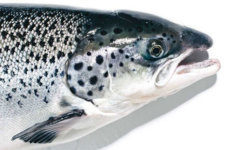The FDA announced that it is committed to helping food developers bring biotechnology innovations to market while at the same time providing consumers with high safety standards. In 2015 FDA approved an AquAdvantage Salmon, a Genetically Engineered (GE) Atlantic salmon that contains the first approved intentional genomic alterations (IGAs) in an animal intended for food use. Today, the FDA is deactivating a 2016 import alert that prevented GE salmon from entering the U.S. However, product alerts were required by Congress. The FDA’s approval of the application related to AquAdvantage Salmon followed a comprehensive analysis of the scientific evidence, which determined that the GE Atlantic salmon met the statutory requirements for safety and effectiveness under the Federal Food, Drug, and Cosmetic Act. The FDA no longer has the authority to issue labeling guidance on this topic; however, the FDA believes this Congressional mandate has been satisfied by the USDA’s issuance of final regulations implementing that law in late 2018 because the law contains labeling indicating that it is bioengineered. @ https://www.fda.gov/NewsEvents/Newsroom/PressAnnouncements/ucm632952.htm?utm_campaign=3-8-2019-GESalmon&utm_medium=email&utm_source=Eloqua
ruth
Statement from FDA Commissioner Scott Gottlieb, M.D., on continued efforts to advance safe biotechnology innovations, and the deactivation of an import alert on genetically engineered salmon
ruth
United States Department of Agriculture- Food Safety and Inspection Service (USDA-FSIS) and Food and Drug Administration (FDA), published an outline of their agreement on how to regulate the budding cell-based meat industry in the US. This agreement gives the FDA oversight of cell collection, cell banks, and cell growth and differentiation. FSI will take over during the cell harvest stage, overseeing production and labeling of human food products derived from the cells of livestock and poultry. According to MeatingPlace, most industry representatives breathed a collective sigh of relief that the agreement finally had been reached. Some in the industry are concerned that cell-based meat will be labeled as beef, while others are concerned that the US will be left behind Israel, China, Japan, the Netherlands, Singapore and other countries that are moving quickly to ensure a clear path to market for this method of meat production. For example “..our position that the term ‘meat,’ and more specifically ‘beef,’ refers to products derived exclusively from the flesh of a bovine animal harvested in the traditional manner,” USCA’s Graner said. “Under the formal agreement, it appears that USDA FSIS will issue the USDA meat inspection stamp to be used on [cell-based] products. Good Food Institute Director of Policy Jessica Almy said the agreement “is a significant step forward in providing a transparent and predictable regulatory path to market for cell-based meat, which will help to ensure that the U.S. does not fall behind. @ https://www.meatingplace.com/Industry/News/Details/84412
Meatingplace.com is the online community for North American beef, pork and poultry processors.
ruth
McDaniel Life-Line LLC recalled all lots of Life-Line Water because FDA analysis found the product to be contaminated with Pseudomonas aeruginosa. The product was distributed in the United States and Canada to individuals via internet. The product can be taken internally or applied externally to the skin. The product is packaged in 1-gallon bottles. The affected Life-Line Water recall includes all lots. Use of the contaminated product has a remote probability of necessitating medical or surgical intervention to preclude or reverse permanent damage to a body structure or function. To date, McDaniel Life-Line LLC has not received any reports of adverse events related to this recall.@ https://www.fda.gov/Safety/Recalls/ucm632843.htm
McDaniel Life-Line LLC is voluntarily recalling all lots of Life-Line Water to the consumer level. This product is being recalled because FDA analysis found the product to be contaminated with Pseudomonas aeruginosa.
ruth
Researchers at the University Of Southern California Viterbi School Of Engineering studied the development of traces of antibiotic resistance DNA in wastewater treatment. The water from these facilities is reintroduced to the environment, causing the spread of antibiotic resistance. The research found that even low concentrations of just a single type of antibiotic lead to resistance to multiple classes of antibiotics. They believe that water treatment facilities can be a hot-bed for antibiotic resistance. One of the common ways in which the wastewater is treated is with a membrane bioreactor, which uses both a filtration system and a biological process where bacteria consume waste products. The bacteria encounter antibiotics in the wastewater and expresses resistance genes. These resistance genes can then be passed on from parent to daughter cell and between neighbors through horizontal gene transfer. The biomass containing these bacteria is disposed of in landfills or used as a fertilizer for agriculture and livestock feed crops. The antibiotic-resistant bacteria and free-floating DNA come out in the effluent that leaves the facility and is often used for irrigation, or to replenish groundwater supplied, a common source of drinking water. The team believes that the amount of antibiotic-resistant organisms formed in treatment plants could be reduced by employing anaerobic, processes rather than aerobic processes. The University of Southern California. “Antibiotic resistance is spreading from wastewater treatment plants.” ScienceDaily. ScienceDaily, 6 March 2019. @ https://www.sciencedaily.com/releases/2019/03/190306125330.htm
The products of wastewater treatment have been found to contain trace amounts of antibiotic resistant DNA. Researchers have found that even low concentrations of just a single type of antibiotic in the water supply leads to resistance to multiple classes of antibiotics.




